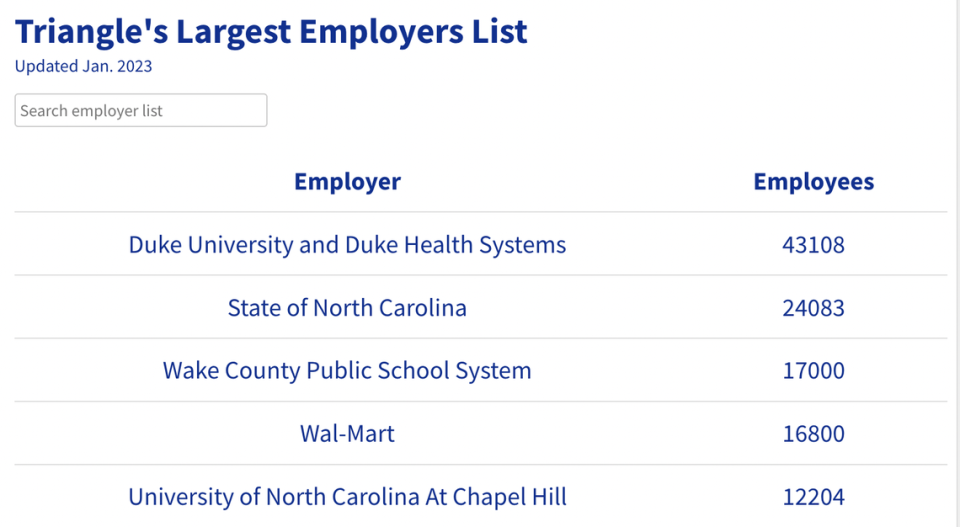Open Source: Noncompetes under threat
What are controversial, common and under threat? Answer: noncompete agreements.
Last month, the Federal Trade Commission proposed banning noncompetes from most employee contracts, arguing they suppress wages by restricting workers from seeking new opportunities. The FTC estimates one in five American workers (about 30 million people) work under noncompetes, and in North Carolina, employment lawyers say these agreements are ubiquitous, especially in health care and tech industries.
Here are some examples of noncompetes I’ve found in North Carolina:
Lowe’s, which is headquartered outside Charlotte, prevents some employees from working at Home Depot for six months after they leave.
UNC Health uses noncompetes. One agreement prevented physicians from working for other providers within a certain number of miles from their current facility for a period of two years after employment.
Triangle-area public companies Wolfspeed, IQVIA and Bandwidth each list noncompetes in their federal SEC filings. None responded to requests for comment about their agreements. .
I was able to obtain a few copies of a noncompete agreement used by Bandwidth, and one section stood out. For a year after leaving Bandwidth, former employees of the communications software provider are not supposed to compete against the company in “any location within the United States of America or Canada.”
Prohibiting competition across such a broad geographic scope is strategic. North Carolina is a state that allows judges to practice something called “blue penciling,” which is when courts remove aspects of noncompete agreements they find unreasonable while leaving the rest intact. It benefits employers to make their agreements broad and let the courts narrow them down if they choose.
So, in the case of Bandwidth, if a court were to decide that prohibiting competition in most of North America is unreasonable, its agreement could still apply in North Carolina and Colorado. And if judges deem N.C. and Colorado to still be too broad, then the agreement moves down to the county level.

“A court, in its discretion, could remove selected jurisdictions by simply crossing out the locations that would make it too broad,” said Zack Anstett, an employment attorney with Parker Poe Adams & Bernstein in Raleigh.
And while some (like the FTC) bristle at noncompetes, Anstett presented an argument for why employers might want to prevent (or at least delay) workers from jumping to certain other companies:
“You have employers who invest in their employees and then provide them with the most proprietary and confidential information that the employer has,” he said. “It’s about that information, that internal know-how.”
After worker death, Durham parents wait for answers
On Oct. 13, an accident at the Wolfspeed facility in Research Triangle Park claimed the life of Vincent Farrell, a 45-year-old electrician, father, and widow from Durham. Since Vincent’s death, I have gotten to know his parents, Patricia and Bryant Farrell.
Today, we published a story on their experience: how they found out about the accident, what the state has told them about the ongoing investigation, and what they want people to know about their only child.

And the Triangle’s largest employers are...
For the first time since 2020, Wake County Economic Development updated its list of the largest Triangle employers. See which companies rose, which organizations fell, and who cracked the list for the first time.
Here’s a glimpse of who sits at the top:

Duke Health hack?
Speaking of large local employers … Duke Health appears to have been targeted in a recent wave of reported cyberattacks by a pro-Russian hacking group. The Durham-based health system wouldn’t confirm the cause of its “intermittent” website issues on Monday, but it wasn’t the only system to experience this problem.
A cool change at Amazon warehouse
In a recent Open Source, I wrote about Amazon workers who said the heat inside their Garner, NC, warehouse had become an issue. Last week, Amazon informed Garner employees their facility would be getting relief in the form of fans before the summer.
New Wolfspeed plant
There’s no easy segue to more Wolfspeed news, but this is good Wolfspeed news. The Durham-based company announced plans to build another massive plant — this time in Germany — to help keep up with the demand for its popular silicon carbide chips. In September, Wolfspeed celebrated a forthcoming factory in Chatham County.
National Tech Happenings
Thursday was a bad day for giant tech companies that start with the letter A. Amazon, Apple, and Alphabet (Google’s parent company) all reported disappointing earnings, with Apple’s revenue falling for the first time since pre-pandemic.
The push to ban TikTok has been led by Republican politicians, but Colorado Sen. Michael Bennet, a Democrat, asked Google and Apple to remove the video app from their respective app stores, citing national security concerns.
OpenAI, the makers of ChatGPT, launched a subscription plan called ChatGPT Plus. Curious to know more about ChatGPT? I asked the AI language model to explain itself to my oldest living relative:

This story was produced with financial support from a coalition of partners led by Innovate Raleigh as part of an independent journalism fellowship program. The N&O maintains full editorial control of the work.
Open Source
Do you enjoy Triangle tech news? Subscribe to Open Source, The News & Observer's weekly technology newsletter and look for it in your inbox every Friday morning. Sign up here.

 Yahoo Movies
Yahoo Movies 
